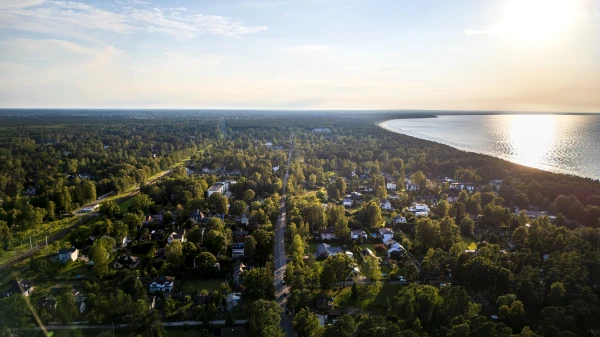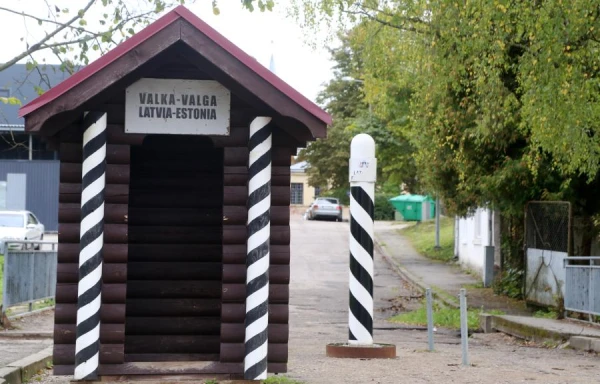
The Constitutional Court recognized the changes in the territorial plan of Jurmala, contested by the environmental and nature protection organization, as inconsistent with the country's constitution, the LETA agency reported from the court.
The disputed regulations in the territorial plan of Jurmala changed the use of certain plots of land, specifically the functional zoning of the plots "Stirnurags 0601", "Bulduri 4508", "Bulduri 5912", "Jaundubulti 2702" and "Pumpuri 3101" was changed from natural territory to territory for private house construction.
The applicant was an association whose goal is the protection of the environment and nature. In its opinion, the changes in functional zoning in the specified areas contradict the principles of environmental protection.
By providing that the disputed plots would be transferred for construction, the municipality did not adequately assess the potential damage to biodiversity and the protected plants growing on these plots, as well as the specially protected habitats of species, ancient trees, and biotopes. Considering this, the rights of the applicant to a favorable environment, as provided for in Article 115 of the Satversme, were violated.
The Constitutional Court indicates that a development planning system has been created to promote the sustainability of the state, within which territorial planning documents are developed. One of the goals of territorial planning according to the principle of sustainability is to preserve and create a quality habitat for present and future generations.
The principle of sustainability is also implemented through the local government's sustainable development strategy, which defines priority development goals and spatial development prospects. Accordingly, the territorial plan must be developed in accordance with this strategy. The court concluded that the Jurmala City Council, when conducting a strategic assessment of the changes to the territorial plan, failed to fulfill its obligation to align land use with the approved development strategy of Jurmala for 2010–2030.
Thus, the development strategy states that large forest areas should not be fragmented, the dune ecosystem must be preserved, natural values should be protected, and natural areas should remain accessible, allowing everyone to enjoy the proximity of nature in the city.
Furthermore, the strategic assessment did not fulfill the obligation to timely and accurately assess and justify the damage that could be caused to the environment as a result of the implementation of the disputed regulations. Already during the public discussion of the changes to the territorial plan, the Jurmala City Council received opinions from competent institutions and an expert on species and biotopes attracted by the Jurmala Conservation Society regarding the irreversible impact that the construction of the disputed plots would have on the specially protected biotope "forest coastal dunes" and the specially protected species of plants and animals living there.
Despite this, the Jurmala City Council postponed the exact assessment and justification of the damage to the environment to the stage of developing a detailed plan, although these actions should have been carried out already at the stage of adopting the territorial plan. Therefore, by providing for construction as the intended use of the disputed plots of land, an assessment of the risk of violating the norms regulating the protection of species, biotopes, and specially protected areas was not conducted. Thus, the strategic assessment of the disputed regulations was conducted improperly and led to a significant procedural violation in this case.
The court concluded that, in order to ensure the sustainability of changes in the territorial plan, the Jurmala City Council also had the obligation to justify that the disputed regulations achieved a balance between ecological, social, and economic interests. That is, it should have been justified that the public benefit outweighs the potential damage to the environment; however, the documents on the changes to the territorial plan did not provide data-based justification confirming this.
In this regard, the court recognized that the principles of sustainability, precaution, and assessment were violated in the adoption of the mandatory regulations of the Jurmala City Council dated January 25, 2024, and they do not comply with Article 115 of the Satversme.
The disputed regulations affect not only the rights of the residents of Jurmala but also society as a whole. The task of the Constitutional Court is to minimize the violation of the rights of society as much as possible and to prevent the emergence of irreversible consequences as a result of the application of the disputed regulations. Therefore, the regulations were declared invalid from the moment they came into force, that is, from February 6, 2024.
The court indicated that one of the principles of territorial planning—the principle of continuity—allows for the cancellation of a territorial plan only if another territorial plan is in effect for the corresponding territory. Thus, the Constitutional Court recognized that the norms of the previous territorial plan of Jurmala, approved by the mandatory regulations of the Jurmala City Council dated March 24, 2016, which were in force until February 5, 2024, apply to the disputed plots.
The decision of the Constitutional Court is final and not subject to appeal.















Leave a comment